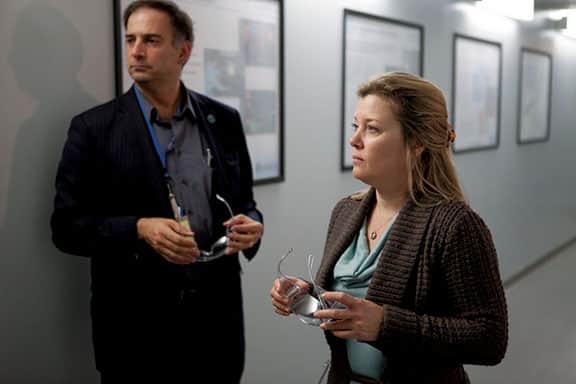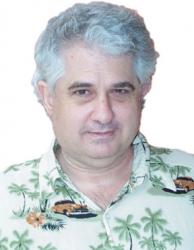Former Local Paula Gant Helps Guide D.C. Through The Transition To Energy Abundance • By Brad Goins
Like millions of Americans, Paula Gant can remember spending many hours of her childhood sitting in her family car as her father inched towards the gas pumps during the Energy Crisis of the 1970s.
Gant doesn’t believe any of her grandchildren will ever have such an experience. In fact, she doesn’t think they’ll experience any significant energy scarcity during their lifetimes.
After all, they’re living in a new age — the age of American energy abundance.
“Our psyche about energy was formed by scarcity,” says Gant. “Now it’s framed by abundance. It’s a historical shift.”
“We have an increasingly abundant outlook” about energy in the U.S. at present, she says. And that’s not just due to increases in the available amount of domestic oil and natural gas and the potentials of fracking. It’s also the fact that “we’ve made tremendous shifts in energy efficiency” in recent years.
The move to an energy of abundance happened in a dynamic period of “four to five years,” she says. “We’ve gone from thinking we are import-dependent to thinking about exporting natural gas.”
“A domestic abundance of the resource and of the [oil and gas] infrastructure is helping,” she says. There are, says Gant, now 2.4 million miles of natural gas pipeline alone in the U.S.
In this new time of energy abundance, “we have to ask different questions,” Gant says. “It’s a very exciting time to be in the administration.”
The administration she’s referring to is the Obama administration, of which she’s a crucial part. She’s been working since fall of 2013 as the Deputy Assistant Secretary for the Office of Oil and Natural Gas in the U.S. Dept. of Energy.
Some of her most important duties include reporting to the Secretary of the Office of Oil and Natural Gas and advising White House advisors, staff and counsel.
She says that at present, she’s overseeing research and development on the “prudent development of [the United States’] oil and natural gas resources.”
By “prudent,” she says, she means that we’re “producing our resources and getting the most out of them” — a process that includes minimizing the negative effects of the resources on the environment and communities and maximizing the positive effects on communities.
‘A Foundational Fuel’
One of the things that’s helped Gant and others in the administration enhance the positive effects of energy is the country’s abundance of natural gas. “Natural gas has played a central role in the president’s energy policy,” says Gant. “He has called it a ‘foundational fuel’ in the last three State of the Union Addresses.”
Because of the increasing and abundant use of natural gas, “we’ve seen a declining trend in greenhouse gases.”
Gant is keen on the small carbon footprint of natural gas. And, she says, “the president is intent on a lower carbon energy gas portfolio. Natural gas will be a vital part of that. The outlook is incredibly promising.”
‘It’s Very Exciting’
Anyone who thinks of the abundance of natural gas and the increased awareness of that phenomenon won’t go long without thinking of the Southwest Louisiana area. Speaking of the cluster of new energy developments here, Gant says, “It’s very exciting. [Cheniere’s] Sabine Pass LNG Project is a very positive development.
“These are investments with a view to the long run. You can’t pick them up and move them.” In other words, these projects will be permanent parts of the communities where they’re built.
Undoubtedly, Gant also has other parts of Louisiana much on her mind. She says the administration is working towards a “sustainable shale growth zone.”
“We want to minimize potential negative impacts and maximize potential uplift to the communities.” Such “uplift” could include developments like new roads and expansions of vocational education.
Wanted: 20,000 New Welders
In regard to both the shale growth zones and the developments taking place in SWLA, Gant says, “We hope the local communities are making efforts” to prepare for the developments in such a way that the communities that are near them prosper for years to come; that community residents become prosperous holders of long-term jobs. “We see this tremendous promise of oil and gas production,” she says. “We want to see that benefits are long-term.”
“It’s important for local leaders to work with industry” in this massive preparation effort. Many cooperative efforts between communities and industry are likely to concern vocational education. Gant says a recent IHS report stated that all the new energy projects developing along the Gulf Coast would eventually require 50,000 welders. At present, there are only 30,000 welders in the area.
The obvious conclusion she draws is that the Gulf Coast is going to have to get more welding instructors.
As the Gulf Coast works to assemble “a skilled work force,” it will, says Gant, be dealing with “a significant transition of talents, as many approach retirement.”
There will have to be specific educational adjustments for both these job situations. “Math and sciences are vital underpinnings” for such enterprises, says Gant.
“We need to be sure we are making math and sciences a priority.” She thinks this priority will have to be in place across the educational board — from vocational, technological education right on up through the university.
‘We’re Going To Need All Our Resources’
Gant obtained the math and science knowledge she used to build her influential career in the Southwest Louisiana area. She is a graduate of Sulphur High and McNeese State University. At McNeese, economics professor Michael Kurth inspired her to go on to graduate school.
She obtained a PhD. in accounting from Auburn. After teaching at the University of Louisville and LSU, she spent several years working with Duke Energy. She was with Duke at the time Enron shocked the energy world by manipulating pricing rules to create huge spikes in the cost of utilities on the West Coast.
Seven years ago, she began working for the American Gas Association.
Gant sees the country’s new abundance of energy resources as providing for much more than the powering of pick-ups, SUVs and sedans. “To meet the needs of the economy,” she says, “we’re going to need all of our resources.”
There is, for instance, the matter of “energy security.” “We expect to increase our energy security and that of our neighbors,” says Gant.
This mutually beneficial relationship will strengthen other kinds of security as well. Energy security extends to security in general, and, says Gant, “enhancing the national security of our allies enhances our security.”


















Comments are closed.